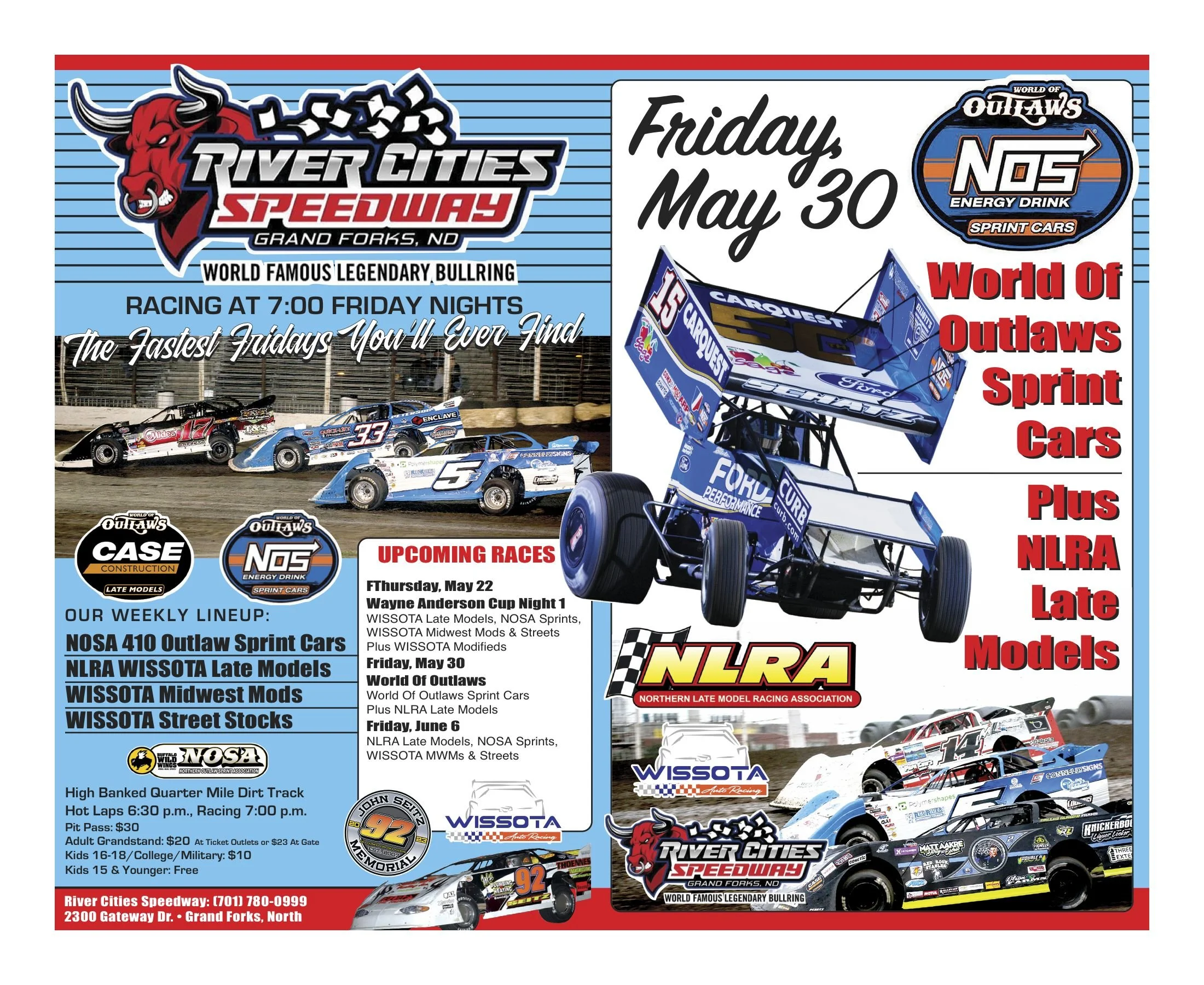5-20 Page 9
By Meghan Diemel, Editor
All The Dirt! Racing News
It’s rare I drop my red editing pen to instead write something for these pages. For the most part, it’s because I have been around dirt track racing long enough to know my opinion about Late Model or Modified racing — the focus of my husband’s life and the classes with which I’m most familiar — is typically a mere dot in a big world full of unsolicited opinions.
Certainly, my opinion’s weight is miniscule when you consider the technical intricacies of managing eight sanctioned classes, as is the case for WISSOTA Auto Racing, and the margins our promoters have to operate within to be successful in today’s economy. Then there is also the consideration of the effects of national and regional touring series on our industry overall, from tires to rule packages, technology and more. The politics of sponsorships are also part of the equation, as sanctioning bodies, the tracks and the drivers all fight for an ever-dwindling slice of the pie. Many times our knee-jerk reactions to something we see or don’t see on a race night are made without taking a moment to have any regard for the bigger picture.
In other words, with nearly three decades of watching dirt racing weekly under my belt, I know enough to know I don’t know everything.
Unfortunately, this race season — which was just two races strong as I wrote this on another a rain-soaked Friday afternoon — has been mired in unnecessary negativity to start, and I feel strongly that something needs to be said. It’s already been another year in a disturbing trend that has continued to grow over the last five to 10 years. We’ve transformed from a family of people from various walks of life who love getting together during the weekends to support grassroots racing at its most pure level ... to keyboard monsters who, frankly, need to get outside and touch grass.
It’s time for a reality check, folks.
It was a rainy, cold spring here in western Wisconsin. Tracks that scheduled early shows with optimism struggled to get their practices in. Two area tracks we frequent were set to hold practices first, but Mother Nature intervened, with below freezing temps and a parade of rainy days during the end of the month, with little drying opportunity in-between.
I feel like this is pretty obvious, but online reactions would say otherwise: yes, it rained — and there is nothing the track personnel could do to avoid that. Tracks waited as long as they could to pull the plug (because of course, there would be equal outrage if they hadn’t), and ultimately they made the best decisions for their race track, drivers’ equipment, and yes — their financial livelihood.
I’m sure they didn’t make that decision in haste. It’s not just the actual track condition they must take into consideration this time of year. The condition of the grounds surrounding the track and the food and beverage that needs to be ordered — or cancelled last minute — are also just a couple of line items that are top of mind.
No one wants their track to lose income. Absolutely no one.
As the rain fell throughout the month and one cancellation turned into many, so too did the unsolicited and sometimes downright nasty comments.
Here were some of those responses to those track posts, announcing the cancellations of practices and races:
“Shocking!”
“Any reason to cancel.”
“It's probably better now then (sic) it will be next Friday.”
“So drivers can run practice but can’t race makes no sense.”
“Wow…..wow…..”
“Rest of the state is already running”
“Whats the hold up ?”
“Candy asses”
Those are the comments that were still up as of this writing. There were more that were worse, if that’s possible, and have since been deleted.
Are we all okay, race fans and drivers? Because the temperature on social media would suggest otherwise.
This false outrage isn’t just happening on the pages of my favorite local tracks. In addition to my role here at ATD, I have my own communications business. Among the tasks I perform each week for my clients, I manage social media pages and write content for several businesses in various industries, including racing. For that content, my research means hitting up every track in USRA to find their results, photos and images, as well as UMP and some IMCA tracks. The comments on their social media pages also range from completely unhinged to vile and woefully ignorant.
I’m fortunate to know a great many good humans involved in dirt track racing, from promoters and track staff to longtime racing sponsors, to the racers and their pit crews. I also know not one of them deserves the verbal lashings they have received — and the most disturbing part is that there hasn’t even been a race held yet in many cases.
If you’ve ever felt the itch to immediately blast a track, there are other things you can do with your apparent spare time. The first action item? Learn more about your sport. While some of those nasty comments from my first examples actually *did* come from a few drivers, I wonder if they aren’t young and ignorant, or simply ignorant, to everything that goes into getting a track opened.
I’ll use my own history as an example. We moved to western Wisconsin in 2012. Within the first couple of years of living here, I remember a previously scheduled opening night was beautiful — it was 70 and sunny and all that jazz. But our local track was unable to open. Why? A simple question was kindly answered by the track board member I asked at that time. They couldn’t open because the track is a county-owned entity and they weren’t able to turn on the track’s water, per the county’s parameters, because it had been below freezing at night to that point.
This is widely known now at this point. If you race this track, you likely know this is the case each year. And if you don’t know or understand, it is easy enough to learn by asking a board member, kindly, for what it’s worth.
A few years later, I also wondered why holding a practice on a night that was previously scheduled for racing was adopted so often as protocol for our area tracks. So, I asked the question. Nicely. With respect to the track volunteers who make those decisions. Turns out, as I learned, it’s important for the track prep crew to observe the surface under racing conditions to know where to improve before actual racing takes place. Throughout practice nights track prep personnel are able to identify areas that might still be too soft or need extra tilling. They can see how much water might have to be applied daily before the next race to bring it back to life, and take care of any holes that develop by diligently working on them prior to the next race. Drivers who I spoke with said they would much rather experience a choppy, “green” race track during a practice night, than figure that out mid-program of a race that counts for points.
All of that makes total sense. No outrage necessary.
Some of the comments are blatant hallucinations. When the “rest of the state is already racing” comment was made on our local track’s social media page, there was just one other track in Wisconsin that had been able to get a show and practice in. So I guess now “we’re” comfortable with lying to support our pretend anger.
The people who volunteer their time to our race tracks, those who are paid for their work, the promoters who own and/or run tracks each weekend, and the drivers themselves have been doing this for a long time in many cases. Though there might not be a doctorate in dirt available, certainly they deserve respect from the rest of us who simply go for a beer or two and a show, and leave immediately when the last checkered flag falls. They know what’s best for the race track and if they do happen to have questions, they usually go straight to the drivers for their input.
As I’ve said before, social media has become a real cesspool, but that doesn’t mean we have to swim in it. We certainly don’t need to comment an unfounded opinion on every post a track makes.
In speaking about the onslaught of negative comments I’ve read over the last three weeks with ATD Publisher Scott Hughes, he brought up a terrific point: we wouldn’t let these people stand in front of a full grandstand and scream these comments on a Friday night; we’d escort them out of the grounds. So, why do we — as an industry — allow those comments to remain on our social media sites? We shouldn’t. Delete and even block is my best advice. (And I say that with two decades in public relations management to support that opinion).
There’s no charge in life for acting like a decent human being, but there is a definite cost to tracks from your poor behavior online.
(And, before someone touts “but free speech,” you’d best read the Constitution again, specifically the first ammendment. It’s perfectly legal for tracks and drivers to muzzle your comments.)
I won’t go as far to say that negative comments close tracks, because I believe there are many factors that lead to track closures and it’s a far more complex path to the end when it occurs. With that said, I do think this toxic atmosphere online can affect the decision making of infrequent race fans. On some of these rainout posts, there are more than 10 negative comments. Who wants to be part of that when it’s your Friday night and you’re simply looking to enjoy yourself? You have every right to protect the atmosphere and experience at your race track from people who can’t help themselves — they aren’t invested in supporting the success of your track or race program anyway.
Going forward, I hope I see less negative comments each week. Ideally, people will realize it’s not productive and find a cure for their bout with typing diarrhea. But, if tracks start deleting and blocking people to protect their brand, I’m good with that, too. We can all do better to starve ourselves of the need to make a nasty, sarcastic or delusional comment, and instead ask questions to learn more.
It takes all of us in this village to make it a pleasant place to visit. Let’s take a deep breath, put away the phone, and focus on the great season we have in front of us, instead of harassing the people who help make it happen each week.







